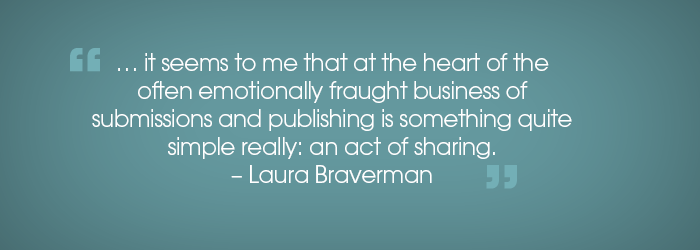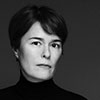The Mentorship Program and My First Book
Laura Braverman | August 2019
AWP celebrates the Writer to Writer participants of Spring 2019. We invited mentors and mentees to share their recent experiences in the mentorship program.

In the spring of 2016, I received news that I had been paired with poet Hélène Cardona for the Writer to Writer mentorship program. I was thrilled at the opportunity but of course could not yet know what an impact it would have on the trajectory of my writing. By that point, I had been focused on writing for about ten years. I had always written creatively since childhood, but it had been a backstage kind of activity until 2006, the year my father died.
During those ten years of writing, I took part in many online courses at various universities—essay, lyric essay, short story, children’s book writing, and poetry. I also attended workshops, including a graduate writing seminar at Bennington, and completed a two-year program with Stanford in creative nonfiction. In 2012, my latent wish to concentrate on poetry was sparked in no small part by the rigorous and compassionate teaching of poet James Arthur. It felt like a wonderful secret: this betrayal of my decision to write nonfiction. I was elated, unbound; the poems were hungry for the page.
It still took three more years, however, to grant myself true permission to shift my attention from nonfiction prose to poetry. Submitting ten poems for my mentorship application was a decisive step. For the first time, I presented myself as a person who writes poetry. In answer to a question about goals, I wrote: “My short-term goal would be to have poems accepted by literary journals. My long-term goals would include composing a collection of poems, for possible (hopeful) publication.”
Up until that point, many friends had asked me why I didn’t publish. What was I doing with my writing? In other words, what were all those hours of work for? And yes, I had been submitting for years, had saved my rejection letters—for a children’s book manuscript, for essays, even for a few poems. I clung to the humor of Chuck Wendig in an essay titled 25 Things Writers Should Know About Rejection. He wrote: “You need to see rejection as…a roadmap of pain that makes you stronger, faster, smarter, and stranger. A writer without rejections under his belt is the same as a farmer with soft hands… Rejections are proof of your efforts.”
The truth is that although I had been submitting pieces, I don’t think I was truly ready to share my work with the world at large before the mentorship program. Maybe I needed those ten years of working in solitude, save for the teachers and fellow students in my many classes. I remember a post-dinner walk through the quiet, lamplit streets of Amherst during a writing workshop in 2012. One of the participants came over to me as I contemplated the nourishing calm, so different from the chaos of my own home city of Beirut. She told me I needed to open up, send my work out into the world. I don’t know why she chose to approach me in this way. But for some reason she did, and it seems to me that at the heart of the often emotionally fraught business of submissions and publishing is something quite simple really: an act of sharing.
I felt seen by Hélène. She validated my work in poetry, helped me to approach it as something real, substantial, possible. She made it seem normal that my work would be published in journals, that it had merit, meant something. I was overwhelmed by her generosity—the introductions to editors at various magazines, the possibilities these introductions provided. In December of 2016, I had my first six poems published in a journal called Live Encounters. My photo and my bio were included in a list of real writers! It felt miraculous. Yes, I know that is a big word, but it really did. A few other publications followed shortly thereafter. And then—it was back to submission lists, back to the scouring of literary journals, back to revisions and cover letters.
By July of 2017, I felt ready to submit my poems as a collection for a consultation at Black Lawrence Press. I cannot stress enough what a vital experience it was to arrange my poems as a collection—to think about the structure as a whole, organize the order of the pieces, see how and why they fit together. Though they were still the same poems that had been saved separately in folders on my laptop, something had nevertheless changed. They were now part of a whole, a whole greater perhaps than the sum of its parts, to borrow Aristotle’s wisdom. Seeing this complete manuscript helped me embrace the idea that this collection might actually someday become a book.
After receiving notes from the Black Lawrence consultation, I sent out the manuscript for chapbook submissions, doing my best to match the tone of my own work with the mission statements of the publishers. In the spring of 2018, at Cosmographia Books, I finally found a publisher with whom the work in my manuscript resonated. She was ready to add me to her list of authors. This happy occurrence eventually led to the signing of a contract, and to publication one year later of my poetry collection, Salt Water.
At the time when my edits on the galley proof were due, I happened to be on a family trip. I couldn’t help thinking back to childhood dreams: of being a writer, of writing from anywhere. My laptop was open on the airplane foldout tray. I leaned over to my husband, voiced my disbelief and wonder: was I really doing this? Editing the galley proofs of my manuscript I don’t know how many miles up in the air?
There I was, working from “anywhere.” The publication of my first book was imminent. This, too, felt miraculous, just as having my first poems published in a journal had. The word “reader” has as its origin the Old English rædere and means "interpreter of dreams." As I share my work, I invite the reader into my dreams. In this exchange, we—writer and reader—share this “being human.”
An excerpt from Laura’s poem “Initiation” from Salt Water (Cosmographia Books, 2019):
Find the rabbit hole
to guide you to treasure
and bleating lamb. You must
pay your dues to the dark:
no treasure
without the lamb.Endurance brings you
Dawn. She who holds the sky
with both arms will bring
roses and gold.
Kiss the edges of her skirts—
and her radiant feet.Hand over your ashes!
Lay down what keeps you
bound. For what
is the seeking of light,
but surrender
by degrees?
 Laura Johanna Braverman is a writer and artist. Her poetry has appeared in journals including Levure Litteraire, Live Encounters, and Sky Island Journal, and is forthcoming in the anthology Awake in the World, Volume II by Riverfeet Press. Her first collection of poetry, Salt Water, was published in 2019 by Cosmographia Books. She received her BFA from Rhode Island School of Design, and studied poetry and essay with Stanford University, Bennington College and the New School. She lives in Lebanon and Austria with her family.
Laura Johanna Braverman is a writer and artist. Her poetry has appeared in journals including Levure Litteraire, Live Encounters, and Sky Island Journal, and is forthcoming in the anthology Awake in the World, Volume II by Riverfeet Press. Her first collection of poetry, Salt Water, was published in 2019 by Cosmographia Books. She received her BFA from Rhode Island School of Design, and studied poetry and essay with Stanford University, Bennington College and the New School. She lives in Lebanon and Austria with her family.
